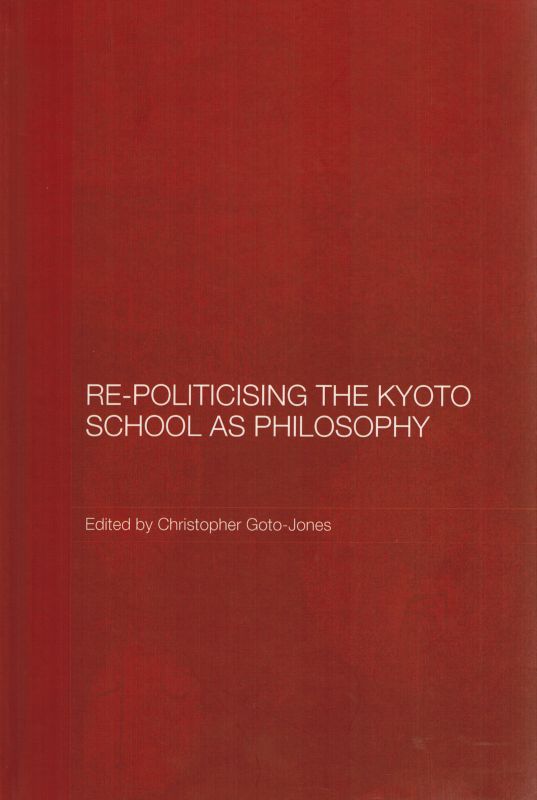Goto-Jones, Re-Politicising the Kyoto School as Philosophy.
Re-Politicising the Kyoto School as Philosophy.
Oxon (UK), Routledge, 2008. 23,5 cm x 16 cm. XVI, 206 pages. Original Hardcover. Excellent condition with only minor signs of external wear.
Includes for example the following essays: Christopher Goto Jones – The Kyoto School and the history of political philosophy: reconsidering the methodological dominance of the Cambridge School / Kevin M. Doak – Romanticism, conservatism and the Kyoto School of philosophy / Naoki Sakai – Resistance to conclusion: the Kyoto School philosophy under the Pax Americana etc etc.
The Kyoto School (Kyoto-gakuha) is the name given to the Japanese philosophical movement centered at Kyoto University that assimilated western philosophy and religious ideas and used them to reformulate religious and moral insights unique to the East Asian cultural tradition.” However, it is also used to describe several postwar scholars from various disciplines who have taught at the same university, been influenced by the foundational thinkers of Kyoto school philosophy, and who have developed distinctive theories of Japanese uniqueness. To disambiguate the term, therefore, thinkers and writers covered by this second sense appear under The Kyoto University Research Centre for the Cultural Sciences.
Beginning roughly in 1913 with Nishida Kitaro, it survived the serious controversy it garnered after World War II to develop into a well-known and active movement. However, it is not a “school” of philosophy in the traditional sense of the phrase, such as with the Frankfurt School or Plato’s Academy. Instead, the group of academics gathered around Kyoto University as a de facto meeting place, and as its founder, Nishida, steadfastly encouraged independent thinking. According to James Heisig, the name “Kyoto School” was first used in 1932 by a student of Nishida and Hajime Tanabe. Jun Tosaka (1900–45) considered himself to be part of the ‘Marxist left-wing’ of the school. Afterwards, the media and other academic institutions outside of Japan began to use the moniker, and by the 1970s it had become a universal title – practically by default. (Wikipedia)
- Keywords: Catalogue Autumn 2020 · Eastern Philosophy · Eastern Philosophy – Rare · Library Graham Parkes · Philosophy
- Language: English
- ISBN: 0415372372
- Inventory Number: 70032AB
EUR 68,--
© 2025 Inanna Rare Books Ltd. | Powered by HESCOM-Software










